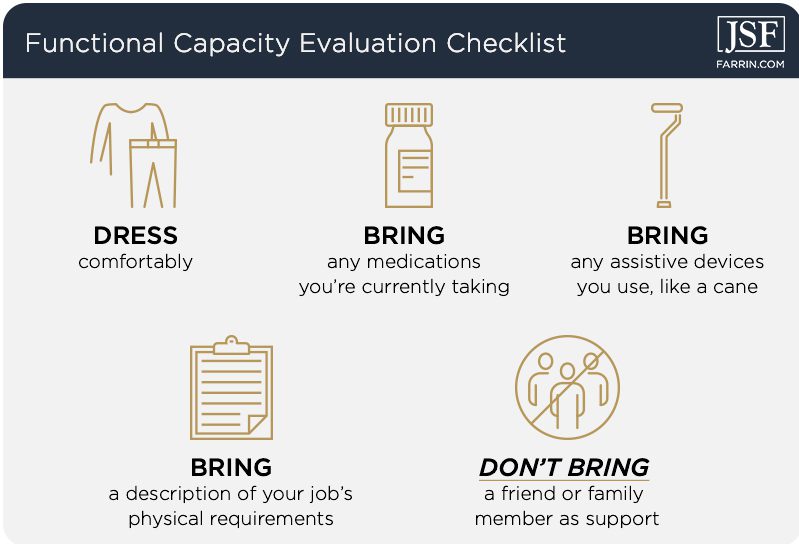When a worker is injured on the job, they undertake a course of medical treatment to help them get better. Of course, “getting better” from an injury isn’t a black or white question. How is it determined when the worker is well enough to return to work?
Your doctor is generally responsible for releasing you back to work when your medical treatment has concluded. To avoid liability and the risk of further injury, a medical release is usually required before you return to work. If your injury was minor and your recovery was complete, it may be relatively easy for the doctor to assess your medical condition and determine that you are capable of returning to your former job. However, in many cases, it is more complicated to determine just exactly how much work an employee is still capable of doing after their injury.
An FCE can help your doctor determine:
-
- When it is physically safe for you to return to work
-
- When you are physically able to do the same job you did before you got injured
-
- How much physical effort you can safely perform at work without reinjuring yourself
What Happens During Functional Capacity Evaluations?
The FCE is meant to measure a person’s functional capacity. The FCE puts you through your paces, typically after the physical therapy process has been completed. Can you bend? Can you reach? Can you twist? Can you lift? Can you do the many fundamental physical movements and motions required of your job? Simply put, the FCE is your physical work performance evaluation.
Functional capacity evaluations involve a number of repetitive physical challenges such as:
- Lifting
- Pushing
- Pulling
- Reaching
- Crawling
- Walking
- Stair climbing
- Bending
- Balancing
- Sitting
- Squatting
- Kneeling
These tests are intended to measure your exact physical strengths and weaknesses and compare them to the actual requirements of your job. You may also be asked to come in on consecutive days, in order to evaluate your stamina and strength across a greater time period. These tests generally last for several hours
While the physical tests are standardized, the focus of the examination will vary based on the job in question. If your job requires repeat heavy lifting throughout the day, for example, that will be an area of focus for your particular Functional Capacity Evaluation.
Where Are FCE Tests Performed?
FCEs generally are performed by a physical or occupational therapist. Your test will be administered at a medical facility of some kind. A physical therapy center is a very common location to perform the FCE.
Things may be overwhelming or hectic on the day of the exam, so here is a quick checklist of what to do and not do on test day:
Can the FCE Be Used Against You?
Sometimes, the insurance company orders a Functional Capacity Examination to try and demonstrate that you are capable of returning to work – even if you don’t feel ready. We have come up against situations where the insurance company has tried to use the FCE as a weapon. This may be part of their efforts to try to:
-
- Convince the doctor that a client is faking or exaggerating their injury
-
- Send someone back to their job, even if it may be too physical for them to handle
-
- Release a worker from treatment before they feel physically ready
A Functional Capacity Evaluation should be fair, administered by an impartial professional, such as a physical therapist, and based on scientific, standardized methods. Unfortunately, FCE standards can vary from provider to provider. Some FCE tests are more accurate than others at measuring a person’s capacity for actual work over an eight- to 10-hour work day. Ultimately, not all FCEs are created equal, and that’s something an injured worker needs to know.
Biased Tests and Provider Notes
The majority of FCE providers do attempt to do a fair and reasonable job for their patients. However, we have firsthand knowledge that some FCEs have been intentionally manipulated by a small number of FCE providers for the purpose of denying the injured worker continued workers’ compensation benefits.
For example, we have seen one FCE provider consistently instruct injured workers to stop the test and take a rest break. Then that provider would write in the evaluation that the person did not give full effort on the test. Another FCE provider has regularly reported that injured workers had been faking or exaggerating their injuries, when other FCE providers and physicians have reached contrary conclusions for the same workers.
FCEs put people in the difficult position of trying to prove that they are giving 100% effort on the test while not trying so hard that they reinjure themselves.
You can see that, like Christopher, your doctor may rely on the FCE test to release you to return to work before you may be ready or without any restrictions. It is very important to be aware of potential issues when your doctor starts talking about releasing you from treatment or returning you to work.
How Can a Functional Capacity Examination Help Your Case?
Your employer and their insurance company may want to get you back to work as soon as possible. If you can’t go back to work without accommodations — or at all — the FCE can be critical proof. Your attorney may order the FCE to help establish that your limitations prevent you from returning to your prior job.
Isn’t Your Doctor’s Diagnosis Enough?
Your doctor may think you’re ready to return because they don’t necessarily know exactly what your job requires of you physically. They also may not understand the laws of workers’ compensation about returning to work. For example, some doctors may assume that the best way to determine if an injured worker is ready to go back to work is to sign off on them going back to work for a short trial period. If the worker cannot perform their job during a trial return to work, your doctor may believe, then workers’ compensation insurance companies will be perfectly willing to restart workers’ compensation checks. That assumption is very frequently wrong.
To protect your own interests, it is best to get a written description of your job functions and discuss it with your doctor in detail. If you are having physical issues or taking medications that will keep you from being able to safely perform your job, you need to let your doctor know. Also tell your doctor if your physical issues on the job could create a danger to other co-workers or the public. No one knows as well as you the physical requirements and dangers of your job.
What Is a Failed FCE?
“Failing” the Functional Capacity Evaluation generally means it’s been decided that you can’t meet the essential requirements of the job you held before your injury. That’s bad news if you were hoping to return to your job as you knew it.
On the other hand, if you already knew that you wouldn’t be able to return to work and were worried the test administrator wouldn’t be able to accurately assess your reduced physical abilities, “failing” the exam can be a good thing. It may mean you have the documentation you need to get the benefits you may deserve.
Don’t Try to Fake a Functional Capacity Evaluation
Take the test normally. Don’t load up on pain medication and over-exert yourself. It’s not the Olympics. By the same token, don’t exaggerate your symptoms or impairments. Your evaluator is trained to spot signs of faking, and they’re very good at it.
The FCE is not the only thing that matters. People’s bodies can feel and respond differently on different days and the test is far from a perfect measure of work conditions. An FCE is just one piece of the puzzle.
How Can the Law Offices of James Scott Farrin Help You?
Our team is comprised of recognized professionals in workers’ compensation. Several of our attorneys have more than ten years of experience. Some speak at seminars for other workers’ compensation attorneys. And we’ve worked for the “other side,” so we know what you’re up against. Several members of our team are former defense attorneys and paralegals for insurance companies.

Get a FREE Case Evaluation from Battle-Tested Workers’ Comp Lawyers
We believe in caution and prudence. There is a lot to know about workers’ compensation law and the system can be extremely difficult to navigate successfully on your own.
That is why we urge anyone who has been injured on the job to contact us or call 1-866-900-7078 immediately after their injury. We will try to ensure that all the necessary measures are taken to preserve your potential right to workers’ compensation benefits.





